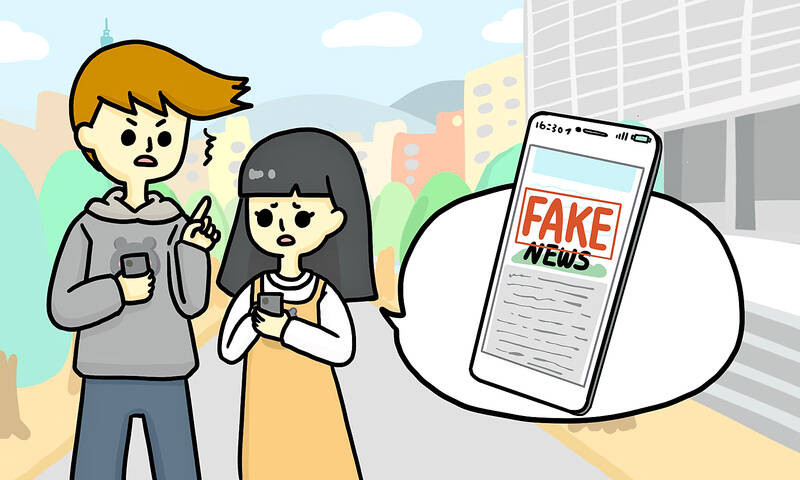對話 Dialogue
小實:馬克,你看!這個影片說美國要收「呼吸稅」了。
Xiǎoshí: Mǎkè, nǐ kàn! Zhège yǐngpiàn shuō Měiguó yào shōu “hūxīshuì” le.

馬克:天哪!小實,這個影片這麼誇張,你也相信嗎?
Mǎkè: Tiān na! Xiǎoshí, zhège yǐngpiàn zhème kuāzhāng, nǐ yěxiāngxìn ma?
小實:我也覺得很誇張,可是很多人傳給我,我就相信了。
Xiǎoshí: Wǒ yě juéde hěn kuāzhāng, kěshì hěnduō rén chuán gěi wǒ, wǒ jiù xiāngxìn le.
馬克:這就是你們中文說的「三人成虎」。
Mǎkè: Zhè jiùshì nǐmen Zhōngwén shuō de “sānrénchénghǔ”.
小實:這個訊息是「假新聞」嗎?
Xiǎoshí: Zhège xùnxí shì “jiǎ xīnwén” ma?
馬克:是啊!我已經查證過了,這個是網友惡搞的。
Mǎkè: Shì a! Wǒ yǐjīng cházhèng guò le, zhège shì wǎngyǒu ègǎo de.
小實:哇!我被騙了!我要趕快告訴傳影片給我的人。
Xiǎoshí: Wa! Wǒ bèi piàn le! Wǒ yào gǎnkuài gàosù chuán yǐngpiàn gěi wǒ de rén.
馬克:還要叫他們以後多注意那些沒有來源的訊息哦。
Mǎkè: Háiyào jiào tāmen yǐhòu duō zhùyì nàxiē méiyǒu láiyuán de xùnxí ó.
翻譯 Translation
Xiaoshi: Mark, look! This video says that the United States is going to have a “breathing tax.”
Mark: Oh my God! Xiaoshi, this video is so over the top, you don’t believe it, do you?
Xiaoshi: I also thought it was over the top, but many people sent it to me, so I believed it.
Mark: This is what the Chinese idiom “When three people call something a tiger, it is a tiger” means.
Xiaoshi: Is it “fake news,” then?
Mark: Yes! I have verified that this is a prank by netizens.
Xiaoshi: Wow! I was fooled! I need to immediately tell everyone who sent me the video.
Mark: And also tell them to pay more attention to unsourced messages in future.
單字片語 Vocabulary
1. 影片 (yǐngpiàn) video
2. 誇張 (kuāzhāng) exaggerate
3. 傳 (chuán) to send, to spread
4. 三人成虎 (sānrénchénghǔ)
[Chinese Idiom] lit. When three people call something a tiger, it is a tiger; Woozle effect.
5. 訊息 (xùnxí) message, information
6. 假 (jiǎ) fake
7. 查證 (cházhèng) to verify
8. 惡搞 (ègǎo) parody, to spoof
9. 騙 (piàn) to cheat; to fool
10. 來源 (láiyuán) source
教材音檔 Audio Files
教材影片 Video Files:
https://www.instagram.com/celc.nou_tw/guide/_/17999106352646292/
實踐大學華語中心提供
By Shih Chien University Chinese Language Center: https://chineseusc.com/

US President Donald Trump has renewed his ambition to take control of Greenland for national security reasons and questioned whether Denmark has any legal right to the Arctic island. The debate has revived scrutiny of how Greenland became part of Denmark, its current self-rule and path to independence, and Washington’s military footprint. HOW DID DENMARK GET GREENLAND? Greenland was inhabited by Inuit peoples from Asia and North America intermittently from around 2,500 BC. Around 985 AD, Vikings led by Erik the Red settled in southern Greenland, farming and building churches. Around the same time, ancestors of today’s Inuit arrived, living as hunters

Owls have long fascinated people with their distinctive appearance and mysterious habits. These nocturnal birds possess large, round eyes and a flat facial disc. Their feathers come in shades of brown, gray, or white, helping them blend easily into the darkness. The most remarkable trait of owls is that they can turn their heads without damaging blood vessels. Contrary to popular belief, they can only rotate their heads up to 270 degrees, not 360 degrees. Owls have 14 cervical vertebrae, which is twice as many as humans. This special physical structure compensates for their inability to move their eyes within their

A: Bloomberg just released its annual travel guide, titled “25 Best Places to Travel in 2026.” What were the best Asian destinations? B: There were actually six Asian hotspots: Taiwan’s Taipei, Malaysia’s Penang, Kazakhstan’s Almaty, Indonesia’s Rote Island, India’s Tiger Reserves, and Oman. A: With its mix of traditional food and modern cuisine, Taipei has become a rising food capital in Asia. B: As Bloomberg reported, “Taiwan is a place that bubbles up in culinary conversation because of its famed beverage, bubble tea, and its early adoption of modern night markets.” A: And Din Tai Fung has now

AI-generated summaries are shaking up the media world. Tools like Google’s AI Overviews now provide users with direct answers above the search results, resulting in fewer people clicking on news links. For publishers who rely on that traffic to generate advertising revenue, this shift is hitting hard. The fallout is measurable. Many sites have seen a sharp drop in traffic since AI summary features rolled out. An analysis revealed that a news outlet that had once ranked first on Google lost up to 79% of its traffic when its link appeared beneath an AI-generated summary. Statistics also show that